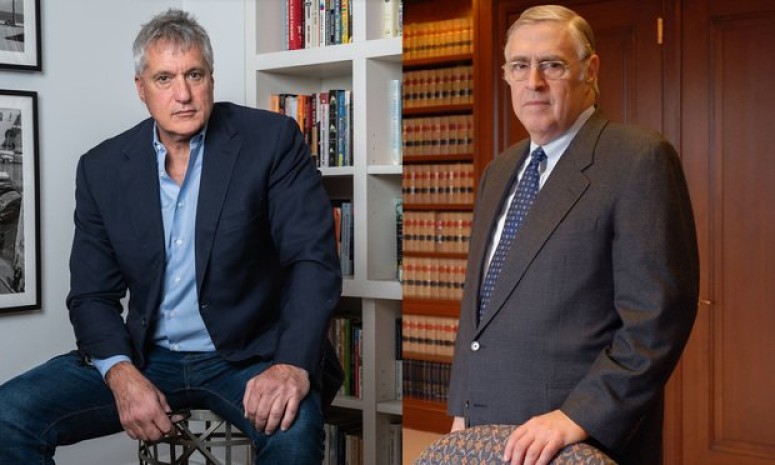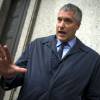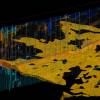Juicio RICO (2011-Presente)
2nd Circuit Largely Upholds Civil Contempt Findings in Donziger RICO Case, But Reverses One
While ruling in lawyer Steven Donziger
Law.com 09/03/2021

2nd Circuit Largely Upholds Civil Contempt Findings in Donziger RICO Case, But Reverses One / Foto: Ryland West/ALM and Rick Kopstein/NYL
The U.S. Court of Appeals for the Second Circuit has handed down a strongly worded majority opinion in the fierce civil court legal fight between Steven Donziger and oil company Chevron, upholding nearly all of a trial judge’s six civil contempt-of-court findings against Donziger but throwing out one of them because the judge had “introduced considerable ambiguity” into an injunction order.
The results of the mixed decision include the appellate court tossing out a more than $650,000 civil contempt-based sanction that had been levied against the embattled lawyer. In addition, the federal trial court in his case, on remand, will have to issue a new attorney fee award to Chevron. The company had been given $3.4 million in fees based on its successful pursuit of the six civil contempt charges. It appears the bulk of the award will stay in place, but some amount must be subtracted now that one contempt count has been reversed.
Separately in the decision, the Second Circuit affirmed a 2018 costs award leveled against Donziger for more than $800,000. The award had been granted to Chevron after Donziger appeared before various special masters and challenged, unsuccessfully, multiple court-ordered injunctions.
The injunctions, civil-contempt findings and awards all spring from a highly complex Racketeer Influenced and Corrupt Organizations Act case first launched in federal court by Chevron against Donziger in 2013. Two years before, in an Ecuadorian court, Donziger, a human rights and environmental lawyer, won an $8.6 billion judgment against the multinational company on behalf of Indigenous Ecuadorians whose health and ancestral land was damaged by oil-drilling waste. Chevron replied by suing in the U.S. District Court for the Southern District of New York, alleging the entire judgment was based on fraud committed by Donziger that included the bribing of judges and ghostwriting a judgment. U.S. District Judge Lewis Kaplan agreed, issuing a more than 600-page decision in Chevron’s favor in 2014. The opinion was affirmed in 2015 by the Second Circuit.
Still, post judgment litigation drags on.
Meanwhile, the new Second Circuit decision comes as separate-but-related criminal contempt charges against Donziger, who faces up to six months in prison, continue before U.S. District Judge Loretta Preska. A bench trial in the criminal prosecution is slated for May 10.
In a 51-page majority opinion, Second Circuit Judges Gerald Lynch and Dennis Jacobs ruled in the civil case that one contempt finding made by Kaplan “cannot stand.” The specific issue centered on Donziger selling certain of his clients’ interests in the $8.6 billion Ecuadorian judgment between 2016 and 2018. In all, according to the majority, Donziger raised more than $1.2 million from investors in the judgment for the purpose, he has said, of funding litigation efforts aimed at collecting the massive amount. (To date, none of the $8.6 billion has been recovered.) Meanwhile, lawyers for Chevron at Gibson, Dunn & Crutcher have argued that Donziger used most of the money for personal expenses rather than litigation efforts.
In an opinion written by Lynch and joined by Jacobs, who were part of a three-judge panel, the majority said that a 2014 injunction issued by Kaplan that prevented Donziger from “undertaking any acts to monetize or profit from the [Ecuadorian] Judgment” was “clear and expansive.” But later language used by Kaplan in issuing a related stay order created ambiguity, according to the majority, about exactly what activities the injunction covered.
The stay order had said in part that the injunction “would not prevent Donziger from being paid, just as he has been paid … over the past nine or ten years,” wrote Lynch, quoting the order. And “there is no question that those fundraising efforts over the past years had included selling to investors shares in any eventual recovery,” he said.
Lynch then wrote that “however paragraph one of the Injunction might have been best construed on its face at the time it was issued, the Stay Order injected considerable uncertainty into it.”
But after Lynch and Jacobs ruled Donziger’s past selling of the clients’ interests could not constitute civil contempt, they then took pains in the opinion to point out that Donziger’s previous such fundraising efforts would not be tolerated in the future.
“Nor should there be any mistaken conclusion that this Opinion somehow authorizes any continued belief on Donziger’s part that the [Kaplan] Injunction permits, going forward, his prior practice of continuing to receive legal fees, or to profit in any manner from the sale of interests of any kind in the Ecuadorian Judgment,” wrote Lynch.
Moreover, in a lengthy paragraph on page 48 of the decision, the majority detailed some of the ways that its one ruling in Donziger’s favor had “no effect on” major judgments and rulings that have gone against Donziger in the long-running RICO litigation.
“Lest this Opinion be taken as somehow vindicating Donziger, it is important to put our holding in context,” Lynch wrote.
“Our ruling today has no effect on, and does not in any way call into question,” he continued, “the district court’s thorough and fully persuasive fact findings and legal conclusions [in 2014], which we have already affirmed in full [in a 2015 opinion], establishing Donziger’s violations of law and ethics that added up to a pattern of racketeering in violation of the RICO statute.”
And earlier in the opinion, which was issued Thursday, Lynch had also written, more explicitly, that Kaplan had found that Donziger, “among other things, bribed the presiding judge [in Ecuador] to enter a judgment in his clients’ favor in exchange for $500,000 of the [$8.6 billion] judgment’s proceeds; coerced the court to appoint a hand-picked expert whom Donziger paid for favorable testimony; and ghost-wrote the Ecuadorian Judgment ‘in whole or in major part’ with only ‘light editing’ by the judge who signed it,” while quoting from Kaplan’s decision.
Donziger and his legal team of mostly pro bono lawyers have fought unsuccessfully in court for Kaplan’s removal from the RICO matter, arguing that the judge carries conflicts of interest. In addition, they have pointed out that Donziger did not get a jury trial in his RICO case, only a bench trial before Kaplan. They’ve also noted that Ecuador’s high court ultimately awarded the $8.6 billion judgment after reviewing a lower court’s decision. (The $8.6 billion was a reduction of a higher amount awarded by the lower court.) Moreover, they’ve said repeatedly that Canada’s high court has affirmed the central part of the Ecuadorian judgment.
Efforts to reach Kaplan for comment for previous stories about the Donziger litigation have been unsuccessful. Southern District court representatives have said it is court “policy that the court does not comment; the court record speaks for itself.”
Among the civil contempt counts upheld against Donziger in the majority’s 51-page decision were charges based on the embattled attorney not handing over to the district court his computer, cellphone and other electronic devices for data harvesting. Kaplan had ordered the devices to be inspected and data to be taken from them by an expert after Chevron alleged Donziger was not complying with paying post-RICO judgment money owed. Donziger appealed the order by Kaplan, and has maintained that turning over his electronic devices would reveal a litany of privileged attorney-client information tied to his Ecuadorian clients.
In the opinion’s dissent, Second Circuit Judge Richard Sullivan agreed with the majority on all of its rulings except for the decision saying Donziger could not be held in civil contempt for having sold Ecuadorian clients’ judgment interests. He wrote that Kaplan’s injunction against such activities was sufficiently clear and should have been followed.
Both Donziger and Chevron attempted to claim victory after the Second Circuit handed down its decision.
In a news release, Donziger, who worked pro se on the appeal, said, “While the decision today is not everything we wanted, it agrees with me on my core claim: that my work over the last five years raising funds for the Ecuadorian communities to pursue enforcement of their judgment against Chevron was appropriate, despite Judge Kaplan trying to claim it was illegal. This is a huge blow to Chevron’s campaign to demonize me as a way to evade paying the Ecuador judgment which we expect to be fully enforced in due course.”
Sean Comey, a Chevron spokesman, quoted from the majority opinion in an email to the New York Law Journal that said in part, “Chevron is pleased that the court of appeals has upheld ‘the district court’s conclusions that Donziger acted in contempt of the Injunction that resulted from the RICO Judgment in numerous ways,’ as well as the district court’s award of costs in Chevron’s favor” based on the injunction litigation.
Comey also said “the court of appeals correctly described that [costs] award as largely the product of Mr. Donziger’s own ‘obstructive conduct’ in this case, in which he ‘has been found liable for engaging in a pattern of racketeering involving corruption of a foreign judiciary.’”
Fuente OriginalNotas relacionadas
-
 Dozinger Still A Flight Risk, Judge-Appointed Prosecutor Says
Dozinger Still A Flight Risk, Judge-Appointed Prosecutor Says -
 Donziger Denies NY Judge's Criminal Contempt Allegations
Donziger Denies NY Judge's Criminal Contempt Allegations -
 Big Data en la geología
Big Data en la geología -
 Steven Donziger’s Pathetic Attempt To Avoid Disbarment In DC
Steven Donziger’s Pathetic Attempt To Avoid Disbarment In DC -
 Steven Donziger, An Idolized, Yet Corrupt Lawyer
Steven Donziger, An Idolized, Yet Corrupt Lawyer -
 Steven Donziger, el caso del abogado corrupto que la izquierda glorifica
Steven Donziger, el caso del abogado corrupto que la izquierda glorifica
